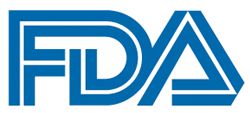FDA Grants Ivosidenib Combo Breakthrough Therapy Designation for IDH1+ AML
The FDA has granted ivosidenib plus azacitidine a breakthrough therapy designation for the treatment of newly diagnosed patients with acute myeloid leukemia who harbor an <em>IDH1 </em>mutation and are ≥75 years old or have comorbidities that would prevent them from receiving intensive induction chemotherapy.

The FDA has granted ivosidenib (Tibsovo) plus azacitidine (Vidaza) a breakthrough therapy designation for the treatment of newly diagnosed patients with acute myeloid leukemia (AML) who harbor anIDH1mutation and are ≥75 years old or have comorbidities that would prevent them from receiving intensive induction chemotherapy.1
The designation was granted as a result of the positive findings seen in a phase Ib/II trial of the combination of ivosidenib and azacitidine that demonstrated an overall response rate (ORR) of 78.3% in adult patients with newly diagnosed AML.
"Outcomes for newly diagnosed [patients with] AML ineligible for intensive chemotherapy are still poor, and there are no approved options specifically for patients with anIDH1mutation," said Chris Bowden, MD, chief medical officer at Agios, the manufacturer of ivosidenib. "The breakthrough therapy designation provides further support that combining azacitidine and ivosidenib for these patients has the potential to be a compelling treatment option."
The breakthrough designation from the FDA will assist in expediting the development and review of the IDH1 inhibitor.
Preliminary findings from the phase Ib portion of the trial were presented at the 17th International Symposium on Acute Leukemias.2The study enrolled 23 patients, 7 in a dose-finding phase and another 16 in an expansion phase. Patients with prior hematologic disorders were allowed in the study, except if they had received prior hypomethylating agents. The study’s primary endpoints were recommended combination dose and safety. Key secondary endpoints included ORR, complete response (CR) rate, and rate of CR plus CR with partial hematologic recovery (CRh).
Participating patients were treated with 500 mg of daily ivosidenib in continuous 28-day cyles plus 75 mg/m2/day of subcutaneous azacitidine on days 1 to 7 of the cycle. The median age of all 23 patients was 76 years (range, 61-88) with 12 patients aged 75 or older. A majority of patients had de novo AML disease (74%), intermediate cytogenetic risk status (65%), and an ECOG performance status of 1 (61%).
As of the data cutoff date of August 1, 2018, 14 patients (61%) remained on treatment. Nine patients had discontinued, due to progressive disease in 3; patient withdrawal in 2; disease relapse, lack of efficacy, death, and allogeneic stem cell transplant in 1 patient each.
Eighteen patients responded (78.3%; 95% CI, 56.3%-92.5%) and the time response overall was 1.8 months (range, 0.7-3.8). The CR rate was 56.5% (95% CI, 34.5%-76.8%) and the rate of CR/CRh was 65.2% (95% CI, 42.7%-83.6%). Two patients (8.7%) achieved a best response of morphologic leukemia-free state. The median duration of response was not estimable.
After a median follow-up of 9.5 months (range, 1.3-24.0), the 12-month OS rate was 82% (95% CI, 59%-93%).
The most common (≥30%) all-grade adverse events (AEs) with the combination were nausea (61%), diarrhea (57%), anemia (52%), thrombocytopenia (52%), constipation (48%), febrile neutropenia (44%), vomiting (39%), pyrexia (39%), fatigue (35%), hypokalemia (35%), dizziness (35%), and insomnia (30%).
Grade 3/4 AEs were experienced by 96% of patients. Those experienced by ≥2 patients included thrombocytopenia (48%); anemia (44%); febrile neutropenia (44%); neutropenia (26%); sepsis (22%); electrocardiogram QT prolongation (13%); lung infection, pneumonia, neutrophil count decrease, platelet count decrease, hyponatremia, atrioventricular block complete, and syncope (9% each).
Serious AEs observed in ≥2 patients consisted of febrile neutropenia (35%); IDH differentiation syndrome, sepsis, and pyrexia (13% each); lung infection, pneumonia, and syncope (9% each).
Differentiation syndrome occurred in 4 patients, 3 of which were serious, but all cases resolved and did not result in discontinuation or death. Three of the patients required treatment with steroids and the study drug was held in 1 patient.
Four deaths occurred, 3 during treatment and 1 during follow-up; none were considered to be related to treatment.
A priority review was granted to ivosidenib in February 2019for the treatment of treatment-naïve patients withIDH1-mutant AML who are ineligible for standard chemotherapy.
Ivosidenib monotherapy is also approved by the FDA for the treatment of adult patients with relapsed/refractory AMLharboring a susceptibleIDH1mutation as detected by an FDA-approved test. The agent is also currently under review for potential approval in Europe.
References:
- Agios Receives FDA Breakthrough Therapy Designation for TIBSOVO® (ivosidenib) in Combination with Azacitidine for the Treatment of Newly Diagnosed Acute Myeloid Leukemia (AML) with an IDH1 Mutation in Adult Patients Ineligible for Intensive Chemotherapy [press release]. Cambridge, MA: Agios Pharmaceuticals, Inc; March 26, 2019. https://bit.ly/2Ow74mP. Accessed March 26, 2019.
- DiNardo CD, Stein AS, Stein EM, et al. Safety and clinical activity of mutant IDH1 inhibitor ivosidenib (AG-120) in combination with azacitidine for newly diagnosed acute myeloid leukemia (ND-AML). Presented at: 17th International Symposium on Acute Leukemias; February 24-27, 2019; Munich, Germany. Abstract 40a.